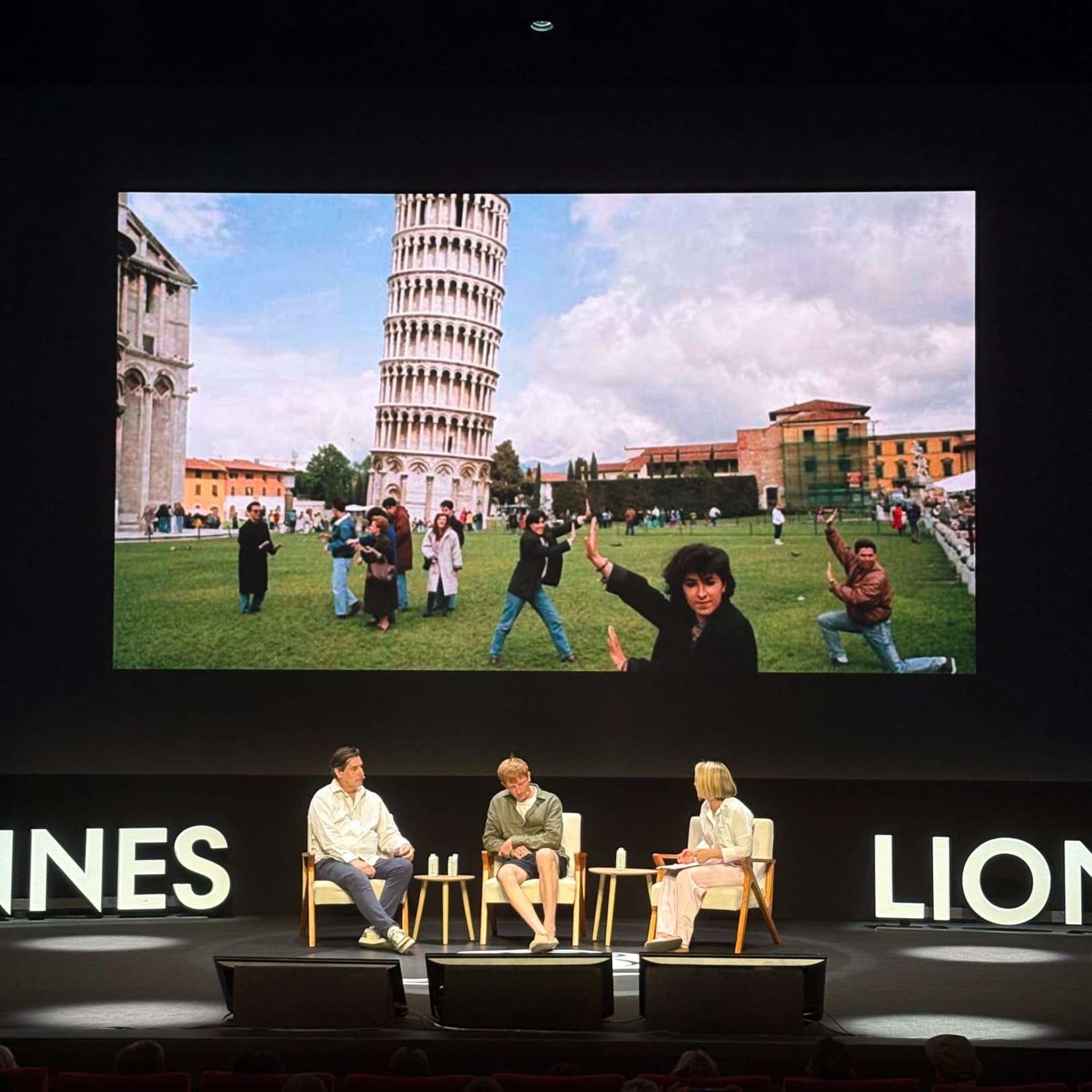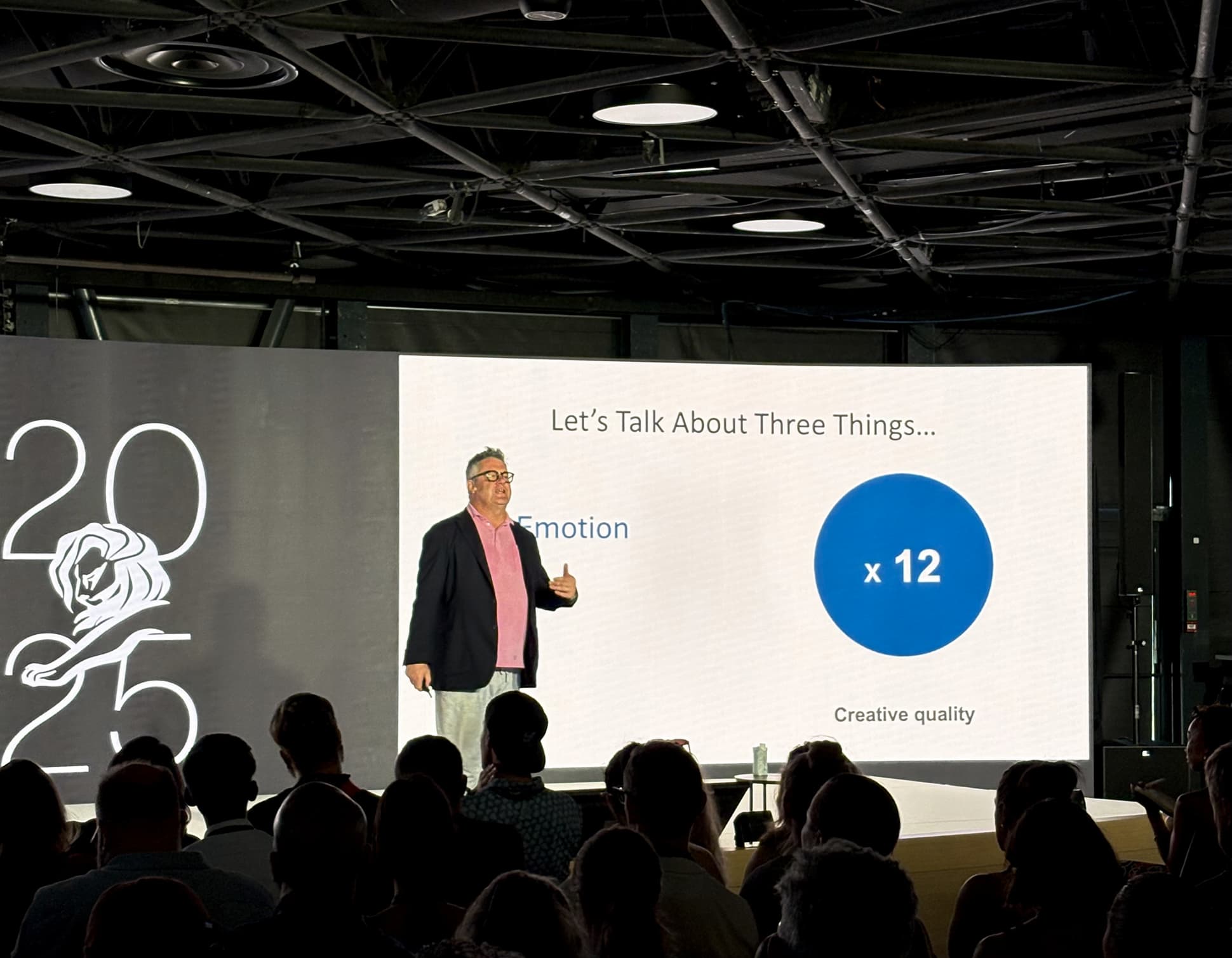Our debrief from the festival's most data-packed day, featuring Mark Ritson's masterclass in effectiveness, a crucial WPP session on decision-making, and why small agencies might be the new big.
Day 4 was, by all accounts, the busiest day on the Croisette. The schedule was dense, the crowds were thick, and a palpable sense of anticipation filled the air for what was arguably the main event of the week: Mark Ritson’s keynote. The day delivered a firehose of information, revealing hard truths and providing data-driven frameworks that cut through the noise. It was, in our opinion, the most valuable day yet.
Here is our debrief.
Saatchi & Saatchi: F*ck Things Up, But Make it Quick
The day began with a Saatchi & Saatchi session celebrating creative partnerships. When asked about his mission, one panelist offered a refreshingly blunt take: “Try to fuck things up just enough so that people get really interested.” It’s a crude but accurate summary of how this industry must operate. If your work isn’t disruptive enough to be noticed, it’s invisible. He argued his job is to create ads that "invite people to participate," forcing the public to take notice.
While this was a potent opening, the energy dissipated quickly. The most valuable insights were delivered in the first few minutes, followed by over twenty minutes of less-than-compelling conversation. A lesson in editing, perhaps.

Laughing at Doom: Make Laughter a KPI
In a welcome shift of tone, a session on using humour in tragic contexts, featuring Bill Nye, was an unexpected highlight. It was a masterclass in American entertainment—funny, sharp, and educational.
The core message was backed by data: humorous ads declined by 33% between 2000 and 2020, yet laughter is proven to lower stress and improve memory—two outcomes brands should be desperate to achieve. The most resonant idea was the proposal to make laughter a KPI. A simple, brilliant thought that could improve both brand performance and society.

Publicis Groupe: Brands as "Content Providers"?
A panel on K-Pop by Publicis Groupe put forward a thesis that brands should no longer be advertisers, but "content providers." We were, frankly, puzzled. This idea stands in direct opposition to the principles espoused by Marc Pritchard, Sir John Hegarty, and, later in the day, Mark Ritson—marketers who have built their careers on the fundamentals of brand building. We can only hope this is a fleeting trend, not the future of the industry.

PepsiCo: Growing the Category, Not the Deck
Jane Wakely of PepsiCo kicked off her session by citing Byron Sharp’s finding that 70% of growth comes from category growth. The strategic implication is sound: to grow your brand, you must first grow the market’s culture. For PepsiCo, this means growing food culture.
What followed, however, felt less like a strategic deep-dive and more like an agency showreel of commercials and CSR initiatives. Perhaps we’re biased by our academic and media agency background, but we were hoping for data, correlations, and actionable principles. We decided to save our time and left. You can't have it all.

Independent and Bold Agencies: Small is the New Big
A panel of four Brazilian founders of boutique agencies confirmed a market shift we’ve seen firsthand: clients are increasingly choosing smaller, independent partners over large networks. They argued that authenticity and innovation, sometimes lacking in network agencies, are driving this change. Their mantra: "Freedom fuels relevance."
Being small, they argued, creates unique advantages. It allows them to hand-pick specialist freelancers for specific projects rather than forcing a client’s needs to fit in-house talent. More importantly, freedom from the crushing overhead of a large payroll allows them to say "no" to projects and clients that contradict their values, such as those in toxic industries like gambling.
For us, as an independent agency, the session was doubly valuable. It was a reaffirmation of our own advantages and, just as importantly, a clear message to clients: though we are small, we are many, and we are a force in this industry.

Rethink: "Doing is the Oxygen of Creativity"
Mike Dubrick, CCO of the independent agency Rethink, shared his agency's fast-paced creative philosophy. A core belief: "Don't make brands famous. Make them constant, make them active." He argued that action is everything, stating, "doing is the oxygen of creativity."
Their problem-solving method prioritizes urgency: "What we must do is more important & essential than what we can do." This contrasts with our own branding-focused approach, which often explores all that we can do to find transformative solutions beyond just communications. Neither model is inherently better; they are simply different tools for different challenges. The "must do" constraint is a powerful way to optimize for speed and unlock a different kind of creativity.
Where we fully align is on the output. The ultimate goal is to express a complex idea in a single, simple message—textual or visual—that needs no further explanation. He also pledged for a "yes, and" mindset, an optimistic approach that seeks to weave possibilities and limitations into a single, effective solution. As we would put it, creativity must be in service of solving a problem. Otherwise, it's just art, and that's another universe entirely.

WPP, L'Oréal & Oxford: How Humans Really Decide
In a data-heavy session by WPP a crucial framework for understanding consumer choice was presented. The opening slide said it all: "Planning for Reach without Receptivity is kind of crazy."
Here are the highlights:
- An astonishing 84% of purchases go to a brand for which the consumer has a prior preference. This means short-term tactics are fighting over, at best, a 16% slice of the market.
- Consumer receptivity to ads is low: 20% have low receptivity, 70% have average receptivity, and only 10% are highly receptive (and likely less loyal).
- Earned, Shared, and Owned touchpoints are three times more powerful than Paid touchpoints at influencing decisions in the Active Stage.
The conclusion is inescapable: you must build brand preference over the long term through relevant, continuous communication tailored to every context. All channels are different, all categories are different, and recycling ideas is a recipe for failure.

The Mark Ritson Masterclass
The highlight of the day, and perhaps the week, was Mark Ritson's speech. The queue was the largest we’d seen, the room was packed, and every single slide was photographed by hundreds of phones. And, of course, his signature greeting – "Hello, fuckers" – was there as usual.
He began by demolishing hollow brand purpose and reaffirming that a good positioning must fit on a single page. (A point many marketers misinterpret, believing it absolves them of the deep strategic work required to get to that single page).
He then laid out a data-backed recipe for creative quality, which, along with brand size, is the biggest multiplier of profitability. The key, he argued, is distinctiveness, not differentiation. His formula has three ingredients:
- Emotion: You must hook the consumer every millisecond. The more intense the emotion—positive or negative—the greater the business effect. Over the long term, broad targeting + high emotion always wins.
- Fluency: Be ruthlessly consistent with your brand assets. Show 3-4 assets a total of 7 times during a commercial. Why? Because as Sarah Carter of Adam&Eve put it, "consumers don't give a shit," and you have to force them to notice you.
- Time: "Ads don't wear out," Ritson declared. "Shit ads wear out." A good ad will work for years, delivering up to 3.5x the effect in its fifth year compared to its first.
This all feeds into his "Compound Creativity" model: a holistic brand metric measured over multiple years, built on creative foundations and a culture of consistency.
The irony was twofold. First, the audience consumed a presentation backed by a tremendous amount of research and data as a simple, entertaining set of rules, seemingly missing its depth and the of the work behind it. Second, many who excitedly declared they would sign up for Ritson's Mini MBA immediately after the talk had lost interest by the next day, believing their notes were a sufficient substitute for genuine study.

Day 4 was the richest in information so far—the most data-driven, the most "secret-revealing." It provided a clear, evidence-based roadmap for effectiveness.
One more day to go.
Explore our complete coverage from the Croisette:
- Day 1 Debrief
- Day 2 Debrief
- Day 3 Debrief
- Day 4 Debrief
- Day 5 Debrief – soon



